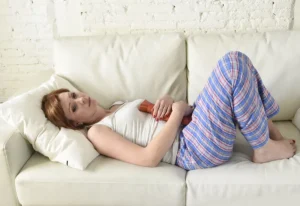
Period pain, also known as dysmenorrhea, is a commonly experienced discomfort during the menstrual cycle. While it’s a normal occurrence for many, there are numerous ways to ease and diminish this discomfort. Here’s a detailed guide on how to relieve menstrual cramps:
1. Over-the-Counter Pain Relief
Utilize non-prescription pain relievers like ibuprofen, naproxen sodium, or acetaminophen, adhering to recommended dosages.
2. Heat Therapy
Applying warmth to the lower abdomen through a heating pad, hot water bottle, or warm baths can relax muscles and ease cramping.
3. Stay Hydrated
Ensure adequate water intake throughout the menstrual cycle to reduce bloating and alleviate cramps.
4. Exercise
Engage in regular, gentle physical activities like walking or stretching to improve blood circulation, but avoid strenuous exercises if uncomfortable.
5. Dietary Changes
Opt for a balanced diet with fruits, vegetables, whole grains, and lean proteins. Cut down on caffeine and excessive salt intake to support menstrual health.
6. Herbal Teas
Enjoy teas with ginger, chamomile, or peppermint, known for their soothing properties that alleviate cramps.
7. Omega-3 Fatty Acids
Incorporate omega-3 rich foods like fatty fish, flaxseeds, and walnuts into your diet for their potential anti-inflammatory effects.
8. Magnesium Supplements
Some studies suggest magnesium supplements might reduce menstrual cramps. Always consult a healthcare professional before taking any supplements.
9. Aromatherapy
Utilize essential oils like lavender or peppermint in aromatherapy to promote relaxation and reduce stress, potentially easing menstrual discomfort.
10. Deep Breathing and Relaxation Techniques
Practice relaxation methods to manage stress, which can affect the severity of menstrual cramps.
11. Prescription Medications
For severe cramps, consult a healthcare professional who might recommend prescription drugs or hormonal birth control to regulate the menstrual cycle.
12. Acupuncture or Acupressure
Some find relief through these methods. Always seek guidance from a qualified practitioner.
13. Transcutaneous Electrical Nerve Stimulation (TENS)
TENS devices may alleviate pain but consult a healthcare professional before using one.
14. Consult Your Doctor
If menstrual cramps significantly impact your daily life, seek advice from a healthcare professional for potential underlying issues and suitable treatments.
It’s crucial to remember that everyone’s body responds differently, so finding the most effective methods might involve some trial and error. If there are concerns about menstrual health, seeking advice from a healthcare professional is essential.
 GhArticles.com Every News in Detail
GhArticles.com Every News in Detail



